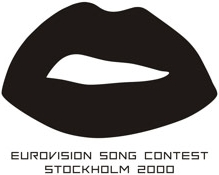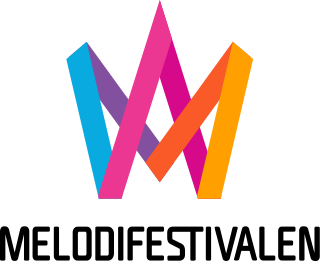
The Eurovision Song Contest 2000 was the 45th edition of the Eurovision Song Contest. It took place in Stockholm, Sweden, following the country's victory at the 1999 contest with the song "Take Me to Your Heaven" by Charlotte Nilsson. Organised by the European Broadcasting Union (EBU) and host broadcaster Sveriges Television (SVT), the contest was held at the Globe Arena on 13 May 2000. The contest was presented by Swedish television presenters Kattis Ahlström and Anders Lundin.

Melodifestivalen is an annual song competition organised by Swedish public broadcasters Sveriges Television (SVT) and Sveriges Radio (SR). It determines the country's representative for the Eurovision Song Contest, and has been staged almost every year since 1959. In the early 2000s, the competition was the most popular television program in Sweden; it is also broadcast on radio and the Internet. In 2012, the heats averaged 3.3 million viewers, and over an estimated four million people in Sweden watched the final, almost half of the Swedish population.

Sweden has participated in the Eurovision Song Contest 62 times since making its debut in 1958, missing only three contests since then. Since 1959, the Swedish entry has been chosen through an annual televised competition, known since 1967 as Melodifestivalen. At the 1997 contest, Sweden was one of the first five countries to adopt televoting. Sweden has hosted the contest six times: three times in Stockholm, twice in Malmö and once in Gothenburg (1985); and is set to host for a seventh time in 2024 in Malmö.
Melodifestivalen is an event organised by Swedish public broadcasters Sveriges Television (SVT) and Sveriges Radio (SR) to determine the country's representative at the Eurovision Song Contest. The voting procedures to select the entrant for the annual contest have varied over the years since the country's debut in 1958. The Swedish broadcasters have experimented with techniques including splitting the juries by age, regional voting, and using an "expert" jury. Televoting was controversially first introduced in 1993, as an unannounced experiment. The Swedish telephone network promptly collapsed under the strain of phone calls being made.
Melodifestivalen is an annual song competition organised by Swedish public broadcasters Sveriges Television (SVT) and Sveriges Radio (SR). It determines the country's representative for the Eurovision Song Contest, and has been staged almost every year since 1959.
Sweden did not compete in the Eurovision Song Contest 1970, as a protest against that four countries shared the victory the preceding year. They were, however, back for the 1971 contest. Five semi-finals, with the same three competitors in all of them, were held in the popular TV show Hylands hörna. The group Family Four won all of the semi-finals, and therefore sung all the songs in the final. The song "Vita vidder", written and composed by Håkan Elmquist, won and represented Sweden at ESC, held in Dublin.
The Swedish national selection for the Eurovision Song Contest was Melodifestivalen 1974. It was, by a runaway score, won by the group ABBA, comprising Anni-Frid Lyngstad, Agnetha Fältskog, Benny Andersson and Björn Ulvaeus. Their song, "Waterloo", was written by Björn and Benny with Stig Anderson. It was originally written in Swedish, but for the ESC final, it was translated into English, which the rules allowed between the years 1973 and 1976.
Sweden was present at the Eurovision Song Contest 1998, held in Birmingham, the United Kingdom.
Sweden was the host of the Eurovision Song Contest 2000 thanks to Charlotte Nilsson's victory the previous year. Sveriges Television chose to hold the contest in Sweden's capital, Stockholm. They were represented by Roger Pontare with the song "When Spirits Are Calling My Name".
Sweden was represented by the group Friends in the Eurovision Song Contest 2001 with schlager song "Lyssna till ditt hjärta". It was written by Thomas G:son and Henrik Sethson.
Sweden participated in the Eurovision Song Contest 2010 with the song "This Is My Life" written by Bobby Ljunggren and Kristian Lagerström. The song was performed by Anna Bergendahl. The Swedish broadcaster Sveriges Television (SVT) organised the national final Melodifestivalen 2010 in order to select the Swedish entry for the 2010 contest in Oslo, Norway. After a six-week-long competition consisting of four heats, a Second Chance round and a final, "This Is My Life" performed by Anna Bergendahl emerged as the winner after achieving the highest score following the combination of votes from six international jury groups, five regional jury groups and a public vote.

"You're Out of My Life" is a song recorded by Swedish singer Darin and was Darin's entry in Melodifestivalen 2010. The song was first performed in Deltävling 3 of Melodifestivalen in Göteborg on 20 February 2010 where Darin reached second place and progressed to the final on March 13 in Stockholm. The single was released on 28 February 2010. This is Darin's first physical single release since his departure from Sony Music.
Sweden participated in the Eurovision Song Contest 2011 with the song "Popular" written by Fredrik Kempe. The song was performed by Eric Saade. The Swedish broadcaster Sveriges Television (SVT) organised the national final Melodifestivalen 2011 in order to select the Swedish entry for the 2011 contest in Düsseldorf, Germany. After a six-week-long competition consisting of four heats, a Second Chance round and a final, "Popular" performed by Eric Saade emerged as the winner after achieving the highest score following the combination of votes from eleven international jury groups and a public vote.
Sweden participated in and won the Eurovision Song Contest 2012 with the song "Euphoria" written by Thomas G:son and Peter Boström. The song was performed by Loreen. The Swedish broadcaster Sveriges Television (SVT) organised the national final Melodifestivalen 2012 in order to select the Swedish entry for the 2012 contest in Baku, Azerbaijan. After a six-week-long competition consisting of four heats, a Second Chance round and a final, "Euphoria" performed by Loreen emerged as the winner after achieving the highest score following the combination of votes from eleven international jury groups and a public vote.
Sweden participated in the Junior Eurovision Song Contest 2013 in Kyiv, Ukraine. The Swedish entry was selected through Lilla Melodifestivalen 2013 which consisted of eight songs. The final was held on 6 June 2013 at the Gröna Lund amusement park in Stockholm. Eliias and his song "Det är dit vi ska" was chosen as the winner.
Sweden participated in and won the Eurovision Song Contest 2015 with the song "Heroes" written by Linnea Deb, Joy Deb and Anton Malmberg Hård af Segerstad. The song was performed by Måns Zelmerlöw. The Swedish broadcaster Sveriges Television (SVT) organised the national final Melodifestivalen 2015 in order to select the Swedish entry for the 2015 contest in Vienna, Austria. After a six-week-long competition consisting of four heats, a Second Chance round and a final, "Heroes" performed by Måns Zelmerlöw emerged as the winner after achieving the highest score following the combination of votes from eleven international jury groups and a public vote.
Sweden participated in the Eurovision Song Contest 2016 with the song "If I Were Sorry" written by Oscar Fogelström, Michael Saxell, Fredrik Andersson and Frans Jeppsson Wall. The song was performed by Frans. In addition to participating in the contest, the Swedish broadcaster Sveriges Television (SVT) also hosted the Eurovision Song Contest after winning the competition in 2015 with the song "Heroes" performed by Måns Zelmerlöw. SVT organised the national final Melodifestivalen 2016 in order to select the Swedish entry for the 2016 contest in Stockholm. After a six-week-long competition consisting of four heats, a Second Chance round and a final, "If I Were Sorry" performed by Frans emerged as the winner after achieving the highest score following the combination of votes from eleven international jury groups and a public vote.
Sweden participated in the Eurovision Song Contest 2017 with the song "I Can't Go On" written by David Kreuger, Hamed "K-One" Pirouzpanah and Robin Stjernberg. The song was performed by Robin Bengtsson. The Swedish broadcaster Sveriges Television (SVT) organised the national final Melodifestivalen 2017 in order to select the Swedish entry for the 2017 contest in Kyiv, Ukraine. After a six-week-long competition consisting of four heats, a Second Chance round and a final, "I Can't Go On" performed by Robin Bengtsson emerged as the winner after achieving the highest score following the combination of votes from eleven international jury groups and a public vote.
Sweden participated in the Eurovision Song Contest 2018. The Swedish broadcaster Sveriges Television (SVT) organised the national final Melodifestivalen 2018 in order to select the Swedish entry for the 2018 contest in Lisbon, Portugal. After a six-week-long competition consisting of four heats, a Second Chance round and a final, "Dance You Off" performed by Benjamin Ingrosso emerged as the winner after achieving the highest score following the combination of votes from eleven international jury groups and a public vote.
Sweden participated in the Eurovision Song Contest 2019. The Swedish broadcaster Sveriges Television (SVT) organised the national final Melodifestivalen 2019 in order to select the Swedish entry for the 2019 contest in Tel Aviv, Israel. After a six-week-long competition consisting of four heats, a Second Chance round and a final, "Too Late for Love" performed by John Lundvik emerged as the winner after achieving the highest score following the combination of votes from eight international juries and a public vote.



